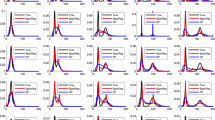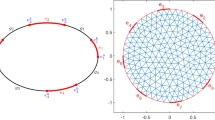Abstract
We propose an iterative algorithm for the minimization of a ℓ 1-norm penalized least squares functional, under additional linear constraints. The algorithm is fully explicit: it uses only matrix multiplications with the three matrices present in the problem (in the linear constraint, in the data misfit part and in the penalty term of the functional). None of the three matrices must be invertible. Convergence is proven in a finite-dimensional setting. We apply the algorithm to a synthetic problem in magneto-encephalography where it is used for the reconstruction of divergence-free current densities subject to a sparsity promoting penalty on the wavelet coefficients of the current densities. We discuss the effects of imposing zero divergence and of imposing joint sparsity (of the vector components of the current density) on the current density reconstruction.



Similar content being viewed by others
References
Beck, A., Teboulle, M.: A fast iterative shrinkage-threshold algorithm for linear inverse problems. SIAM J. Imaging Sci. 2(1), 183–202 (2009)
Bonettini, S., Ruggiero, V.: An alternating extragradient method for total variation-based image restoration from Poisson data. Inverse Probl. 27(9), 095001 (2011)
Brodie, J., Daubechies, I., De Mol, C., Giannone, D., Loris, I.: Sparse and stable Markowitz portfolios. Proc. Natl. Acad. Sci. USA 106(30), 12267–12272 (2009)
Bruckstein, A.M., Donoho, D.L., Elad, M.: From sparse solutions of systems of equations to sparse modeling of signals and images. SIAM Rev. 51(1), 34–81 (2009)
Candès, E., Wakin, M.B.: An introduction to compressive sampling. IEEE Signal Process. Mag. 25(2), 21–30 (2008)
Chen, S.S., Donoho, D.L., Saunders, M.A.: Atomic decomposition by basis pursuit. SIAM J. Sci. Comput. 20(1), 33–61 (1998)
Cohen, A., Daubechies, I., Feaveau, J.: Biorthogonal bases of compactly supported wavelets. Commun. Pure Appl. Math. 45(5), 485–560 (1992)
Combettes, P.L., Pesquet, J.-C.: Proximal splitting methods in signal processing. In: Bauschke, H.H., Burachik, R.S., Combettes, P.L., Elser, V., Luke, D.R., Wolkowicz, H. (eds.) Fixed-Point Algorithms for Inverse Problems in Science and Engineering, pp. 185–212. Springer, Berlin (2011)
Daubechies, I.: Ten Lectures on Wavelets. SIAM, Philadelphia (1992)
Daubechies, I., Defrise, M., De Mol, C.: An iterative thresholding algorithm for linear inverse problems with a sparsity constraint. Commun. Pure Appl. Math. 57(11), 1413–1457 (2004)
Del Gratta, C., Pizzella, V., Tecchio, F., Romani, G.: Magnetoencephalography—a noninvasive brain imaging method with 1 ms time resolution. Rep. Prog. Phys. 64(12), 1759–1814 (2001)
Fornasier, M., Pitolli, F.: Adaptive iterative thresholding algorithms for magnetoencephalography (MEG). J. Comput. Appl. Math. 221(2), 386–395 (2008)
Fornasier, M., Rauhut, H.: Recovery algorithms for vector-valued data with joint sparsity constraints. SIAM J. Numer. Anal. 46(2), 577–613 (2008)
Lemarie-Rieusset, P.G.: Ondelettes vecteurs à divergence nulle. C. R. Acad. Sci. Paris 313(5), 213–216 (1991)
Lemarie-Rieusset, P.G.: Analyses multi-résolutions non orthogonales, commutation entre projecteurs et dérivation et ondelettes vecteurs à divergence nulle. Rev. Mat. Iberoam. 8(2), 221–237 (1992)
Litvinov, W.G., Rahman, T., Tai, X.-C.: A modified TV-Stokes model for image processing. SIAM J. Sci. Comput. 33(4), 1574–1597 (2011)
Loris, I., Verhoeven, C.: On a generalization of the iterative soft-thresholding algorithm for the case of non-separable penalty. Inverse Probl. 27(12), 125007 (2011)
Mallat, S.: A Wavelet Tour of Signal Processing: The Sparse Way, 3rd edn. Academic Press, San Diego (2009)
Ronchi, C., Iacono, R., Paolucci, P.: The “cubed sphere”: A new method for the solution of partial differential equations in spherical geometry. J. Comput. Phys. 124(1), 93–114 (1996)
Rudin, L.I., Osher, S., Fatemi, E.: Nonlinear total variation based noise removal algorithms. Physica, D 60(1–4), 259–268 (1992)
Simons, F.J., Loris, I., Nolet, G., Daubechies, I.C., Voronin, S., Judd, J.S., Vetter, P.A., Charléty, J., Vonesch, C.: Solving or resolving global tomographic models with spherical wavelets, and the scale and sparsity of seismic heterogeneity. Geophys. J. Int. 187(2), 969–988 (2011)
Stevenson, R.: Divergence-free wavelet bases on the hypercube: free-slip boundary conditions, and applications for solving the instationary Stokes equations. Math. Comput. 80(275), 1499–1523 (2011)
Zhang, X., Burger, M., Osher, S.: A unified primal-dual algorithm framework based on Bregman iteration. J. Sci. Comput. 46(1), 20–46 (2011)
Acknowledgements
I.L. is research associate of the Fonds de la recherche Scientifique-FNRS (Belgium). Part of this research was done while the authors were at the Computational and Applied Mathematics Programme of the Vrije Universiteit Brussel and was supported by VUB GOA-062 and by the Fonds voor Wetenschappelijk Onderzoek-Vlaanderen grant G.0564.09N. The authors would like to thank M. Fornasier and F. Pitolli for the useful discussions on MEG and the referees for their constructive comments.
Author information
Authors and Affiliations
Corresponding author
Rights and permissions
About this article
Cite this article
Loris, I., Verhoeven, C. An iterative algorithm for sparse and constrained recovery with applications to divergence-free current reconstructions in magneto-encephalography. Comput Optim Appl 54, 399–416 (2013). https://doi.org/10.1007/s10589-012-9482-y
Received:
Published:
Issue Date:
DOI: https://doi.org/10.1007/s10589-012-9482-y




